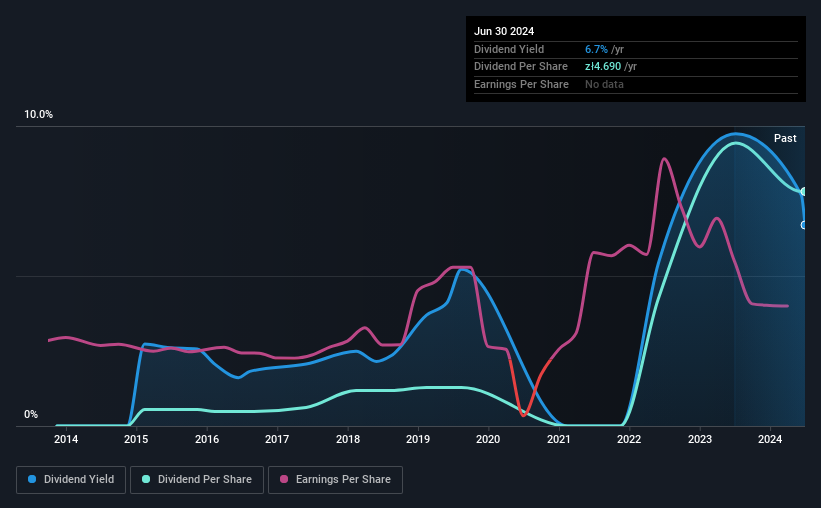Here's Why We're Wary Of Buying Polskie Towarzystwo Wspierania Przedsiebiorczosci's (WSE:PTW) For Its Upcoming Dividend

Polskie Towarzystwo Wspierania Przedsiebiorczosci S.A. (WSE:PTW) stock is about to trade ex-dividend in four days. The ex-dividend date is one business day before the record date, which is the cut-off date for shareholders to be present on the company's books to be eligible for a dividend payment. It is important to be aware of the ex-dividend date because any trade on the stock needs to have been settled on or before the record date. Accordingly, Polskie Towarzystwo Wspierania Przedsiebiorczosci investors that purchase the stock on or after the 5th of July will not receive the dividend, which will be paid on the 16th of July.
The company's next dividend payment will be zł4.69 per share. Last year, in total, the company distributed zł4.69 to shareholders. Looking at the last 12 months of distributions, Polskie Towarzystwo Wspierania Przedsiebiorczosci has a trailing yield of approximately 6.7% on its current stock price of zł70.00. Dividends are a major contributor to investment returns for long term holders, but only if the dividend continues to be paid. So we need to investigate whether Polskie Towarzystwo Wspierania Przedsiebiorczosci can afford its dividend, and if the dividend could grow.
See our latest analysis for Polskie Towarzystwo Wspierania Przedsiebiorczosci
If a company pays out more in dividends than it earned, then the dividend might become unsustainable - hardly an ideal situation. Polskie Towarzystwo Wspierania Przedsiebiorczosci distributed an unsustainably high 147% of its profit as dividends to shareholders last year. Without extenuating circumstances, we'd consider the dividend at risk of a cut. Yet cash flows are even more important than profits for assessing a dividend, so we need to see if the company generated enough cash to pay its distribution. It paid out 106% of its free cash flow in the form of dividends last year, which is outside the comfort zone for most businesses. Cash flows are usually much more volatile than earnings, so this could be a temporary effect - but we'd generally want to look more closely here.
Polskie Towarzystwo Wspierania Przedsiebiorczosci does have a large net cash position on the balance sheet, which could fund large dividends for a time, if the company so chose. Still, smart investors know that it is better to assess dividends relative to the cash and profit generated by the business. Paying dividends out of cash on the balance sheet is not long-term sustainable.
Cash is slightly more important than profit from a dividend perspective, but given Polskie Towarzystwo Wspierania Przedsiebiorczosci's payouts were not well covered by either earnings or cash flow, we would be concerned about the sustainability of this dividend.

Have Earnings And Dividends Been Growing?
Businesses with shrinking earnings are tricky from a dividend perspective. If earnings fall far enough, the company could be forced to cut its dividend. Readers will understand then, why we're concerned to see Polskie Towarzystwo Wspierania Przedsiebiorczosci's earnings per share have dropped 5.0% a year over the past five years. Ultimately, when earnings per share decline, the size of the pie from which dividends can be paid, shrinks.
Another key way to measure a company's dividend prospects is by measuring its historical rate of dividend growth. Polskie Towarzystwo Wspierania Przedsiebiorczosci has delivered 34% dividend growth per year on average over the past nine years. That's intriguing, but the combination of growing dividends despite declining earnings can typically only be achieved by paying out a larger percentage of profits. Polskie Towarzystwo Wspierania Przedsiebiorczosci is already paying out 147% of its profits, and with shrinking earnings we think it's unlikely that this dividend will grow quickly in the future.
Final Takeaway
Is Polskie Towarzystwo Wspierania Przedsiebiorczosci worth buying for its dividend? It's looking like an unattractive opportunity, with its earnings per share declining, while, paying out an uncomfortably high percentage of both its profits (147%) and cash flow as dividends. This is a starkly negative combination that often suggests a dividend cut could be in the company's near future. With the way things are shaping up from a dividend perspective, we'd be inclined to steer clear of Polskie Towarzystwo Wspierania Przedsiebiorczosci.
Although, if you're still interested in Polskie Towarzystwo Wspierania Przedsiebiorczosci and want to know more, you'll find it very useful to know what risks this stock faces. Every company has risks, and we've spotted 4 warning signs for Polskie Towarzystwo Wspierania Przedsiebiorczosci you should know about.
A common investing mistake is buying the first interesting stock you see. Here you can find a full list of high-yield dividend stocks.
New: Manage All Your Stock Portfolios in One Place
We've created the ultimate portfolio companion for stock investors, and it's free.
• Connect an unlimited number of Portfolios and see your total in one currency
• Be alerted to new Warning Signs or Risks via email or mobile
• Track the Fair Value of your stocks
Have feedback on this article? Concerned about the content? Get in touch with us directly. Alternatively, email editorial-team (at) simplywallst.com.
This article by Simply Wall St is general in nature. We provide commentary based on historical data and analyst forecasts only using an unbiased methodology and our articles are not intended to be financial advice. It does not constitute a recommendation to buy or sell any stock, and does not take account of your objectives, or your financial situation. We aim to bring you long-term focused analysis driven by fundamental data. Note that our analysis may not factor in the latest price-sensitive company announcements or qualitative material. Simply Wall St has no position in any stocks mentioned.
Have feedback on this article? Concerned about the content? Get in touch with us directly. Alternatively, email editorial-team@simplywallst.com
About WSE:PTW
Polskie Towarzystwo Wspierania Przedsiebiorczosci
Polskie Towarzystwo Wspierania Przedsiebiorczosci S.A.
Flawless balance sheet slight.


